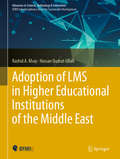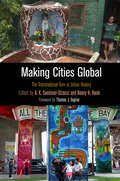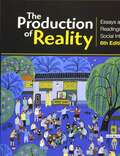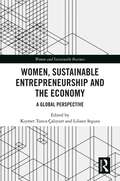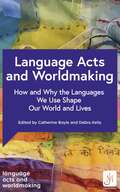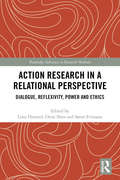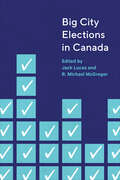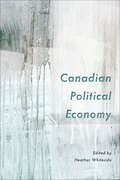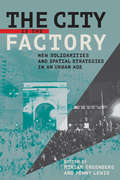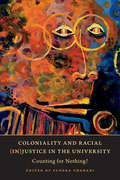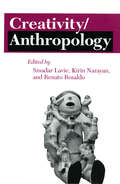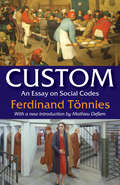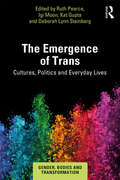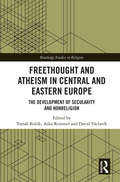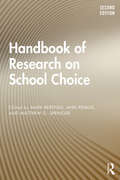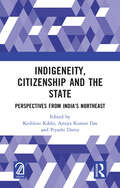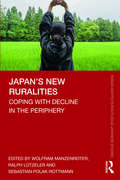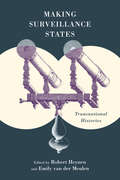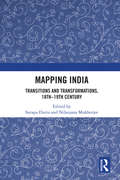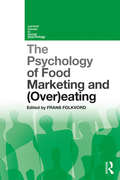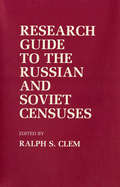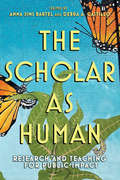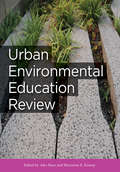- Table View
- List View
Adoption of LMS in Higher Educational Institutions of the Middle East (Advances in Science, Technology & Innovation)
by Rashid A. Khan Hassan Qudrat-UllahThis book discusses the adoption of learning management systems (LMS) in higher education institutions. It presents influential predictors that may impact instructors’ behavioral intention to adopt learning management systems in the context of Arab culture, as well as a unique model of technology acceptance that draws on and combines previous technology adoption models (i.e., a modified unified theory of acceptance and use of technology model – UTAUT2). Moreover, this study extends the UTAUT2 model by including Hofstede’s (1980) cultural dimensions, and technology awareness as the moderators of the model. It also describes the explanatory technique approach used to collect quantitative data from the instructors at higher education institutions in Saudi Arabia and were analyzed with structural equation modeling using SPSS/Amos software. The findings revealed that facilitating conditions were the strongest predictor of behavioral intention to adopt an LMS, followed by performance expectancy and hedonic motivation, technology awareness, and cultural dimensions exerted a moderating influence on instructors’ behavioral intention to use LMS in their teaching. By including new constructs, this becomes the first study of its kind exploring instructors’ use of LMS in Higher Educational Institutions of Saudi Arabia and other countries of the Middle East. It offers practical insights for a broad range of researchers and professionals at higher education institutions and serves as a reference guide for designers of learning management systems (e.g., blackboard systems), policymakers, and the Ministry of Education staff.
Making Cities Global: The Transnational Turn in Urban History
by A. K. Sandoval-Strausz Nancy H. Kwak Thomas J. SugrueIn recent decades, hundreds of millions of people across the world have moved from rural areas to metropolitan regions, some of them crossing national borders on the way. While urbanization and globalization are proceeding with an intensity that seems unprecedented, these are only the most recent iterations of long-term transformations—cities have for centuries served as vital points of contact between different peoples, economies, and cultures. Making Cities Global explores the intertwined development of urbanization and globalization using a historical approach that demonstrates the many forms transnationalism has taken, each shaped by the circumstances of a particular time and place. It also emphasizes that globalization has not been persistent or automatic—many people have been as likely to resist or reject outside connections as to establish or embrace them.The essays in the collection revolve around three foundational themes. The first is an emphasis on connections among the United States, East and Southeast Asia, Latin America, and South Asia. Second, contributors ground their studies of globalization in the built environments and everyday interactions of the city, because even world-spanning practices must be understood as people experience them in their neighborhoods, workplaces, stores, and streets. Last is a fundamental concern with the role powerful empires and nation-states play in the emergence of globalizing and urbanizing processes.Making Cities Global argues that combining urban history with a transnational approach leads to a richer understanding of our increasingly interconnected world. In order to achieve prosperity, peace, and sustainability in metropolitan areas in the present and into the future, we must understand their historical origins and development.Contributors: Erica Allen-Kim, Leandro Benmergui, Matt Garcia, Richard Harris, Carola Hein, Nancy Kwak, Carl Nightingale, Amy C. Offner, Margaret O'Mara, Nikhil Rao, A. K. Sandoval-Strausz, Arijit Sen, Thomas J. Sugrue.
The Production of Reality: Essays and Readings on Social Interaction
by Jodi O 8242 BrienA one-of-a-kind social psychology book that inspires readers to be awake in the world. In this new, Sixth Edition, Jodi O’Brien continues to explore the historical development of the concept of the self, and help readers see the patterns we use to make sense of our own lives. The book introduces the major theories, concepts, and perspectives of contemporary social psychology in a uniquely engaging manner. Compelling original essays that provide an overarching framework are followed by a wide-ranging set of readings. By grounding social psychology in student experiences and explaining theories through stories and narratives, this one-of-a-kind book helps students understand the forces that shape their feelings, thoughts, and actions. Contributor to the SAGE Teaching Innovations & Professional Development Award Find out more at www.sagepub.com/sociologyaward
Women, Sustainable Entrepreneurship and the Economy: A Global Perspective (Women and Sustainable Business)
by K 305 ymet Tunca Çalı Yurt Liliane SeguraWhen a woman decides to become an ‘entrepreneur,’ she starts her business with a sense of excitement, freedom, wealth, happiness, prestige; however, these feelings can soon turn to fears over debt, difficulties, unpaid invoices, stress, and uncertainty. Being an entrepreneur means taking risks, making decisions, adapting management styles in line with developmental needs, clashing with rivals, being more agile than competitors, negotiating risky scenarios, following business trends, capturing new opportunities before, and being better than the competition. If a woman wants to be successful as an entrepreneur, she needs to have a business education, undergo continued professional development, and have patience and emotional intelligence. Supporting women in their entrepreneurial activities has been shown to positively affect the economy, which is why governments pay special attention to opening new funding opportunities and training programs for women who want to start or develop a business. Female entrepreneurship has individual characteristics because of those aspects of the business which are affected by cultural, technological, legislative, social, and historical developments. This book discusses the relationship between female entrepreneurship and the economy, and academic authors from developing countries such as Brazil, Turkey, Albania, Kosovo, Portugal, and Malaysia analyze the developments encompassing women and entrepreneurship in their respective countries. The authors discuss the regulatory frameworks of each country to show how these either help or hinder female entrepreneurship, and consequently, the place of women in the economy. Women and entrepreneurship is an emerging theme, and this book is a must-read for researchers from both developing and developed countries.
Language Acts and Worldmaking: How and Why the Languages We Use Shape Our World and Our Lives
byCollectively authored by the Language Acts and Worldmaking team, this defining volume offers reflective narratives on research, theory and practice over the course of the flagship project of the same name, funded by the Arts and Humanities Research Council's Open World Research Initiative. It returns to the project's key principles - that our words make worlds and we are agents in worldmaking - analyses the practices and outcomes of collaborative working, and looks to the future by offering concrete ideas for how the work they have done can now continue to do its work in the world.Focusing on the key research strands, this volume looks at the role of the language teacher as a mediator between languages and cultures, worldmaking in modern languages, translation and the imagination, languages and hospitality, digital mediations, and how words change and make worlds. Critically, it analyses the impact on communities of living in multilingual cities, and the ways in which learning a first language, and then a second, and so on, plays a crucial role in our ability to understand our culture in relation to others and to appreciate the ways in which they are intertwined.Specific aims are to: · propose new ways of bridging the gaps between those who teach and research languages and those who learn and use them in everyday contexts from the professional to the personal · put research into the hands of wider audiences · share a philosophy, policy and practice of language teaching and learning which turns research into action · provide the research, experience and data to enable informed debates on current issues and attitudes in language learning, teaching and research · share knowledge across and within all levels and experiences of language learning and teaching · showcase exciting new work that derives from different types of community activity and is of practical relevance to its audiences · disseminate new research in languages that engages with diverse communities of language practitioners.
Language Acts and Worldmaking: How and Why the Languages We Use Shape Our World and Our Lives
byCollectively authored by the Language Acts and Worldmaking team, this defining volume offers reflective narratives on research, theory and practice over the course of the flagship project of the same name, funded by the Arts and Humanities Research Council's Open World Research Initiative. It returns to the project's key principles - that our words make worlds and we are agents in worldmaking - analyses the practices and outcomes of collaborative working, and looks to the future by offering concrete ideas for how the work they have done can now continue to do its work in the world.Focusing on the key research strands, this volume looks at the role of the language teacher as a mediator between languages and cultures, worldmaking in modern languages, translation and the imagination, languages and hospitality, digital mediations, and how words change and make worlds. Critically, it analyses the impact on communities of living in multilingual cities, and the ways in which learning a first language, and then a second, and so on, plays a crucial role in our ability to understand our culture in relation to others and to appreciate the ways in which they are intertwined.Specific aims are to: · propose new ways of bridging the gaps between those who teach and research languages and those who learn and use them in everyday contexts from the professional to the personal · put research into the hands of wider audiences · share a philosophy, policy and practice of language teaching and learning which turns research into action · provide the research, experience and data to enable informed debates on current issues and attitudes in language learning, teaching and research · share knowledge across and within all levels and experiences of language learning and teaching · showcase exciting new work that derives from different types of community activity and is of practical relevance to its audiences · disseminate new research in languages that engages with diverse communities of language practitioners.
Action Research in a Relational Perspective: Dialogue, Reflexivity, Power and Ethics (Routledge Advances in Research Methods)
Action Research in a Relational Perspective brings together an expert international academic team to present theoretical perspectives on social constructionist understandings of action research, as well as illustrative examples of action research practices within a wide range of sectors such as organizational learning, leadership development, education, mental health and health care. Building bridges between theory and practice, this book explores themes of dialogue, relationships, tensions, power and ethics in action research projects. It examines both the great potential, and the challenges and dilemmas, of action research. It aims to inspire readers with ideas and a practical "how-to" understanding of doing action research from a social constructionist standpoint. Action Research in a Relational Perspective will appeal to theoreticians and practitioners, senior researchers and PhD students, students, consultants, educators and managers who are interested in action research as an approach to organizational learning, team development, learning among professionals and citizens, or community development.
Big City Elections in Canada
Local elections are an increasingly popular area of research among scholars of Canadian political behaviour, offering invaluable insights into the attitudes and motivations of Canadian electors. The Canadian Municipal Election Study (CMES) has collected unparalleled individual-level survey data in eight major Canadian municipal elections: Vancouver, Calgary, Winnipeg, London, Mississauga, Toronto, Montreal, and Quebec City. These elections, which took place in 2017 and 2018, were high-profile, contentious, and often surprising, featuring mayoral defeats, record-breaking turnouts, provincial-municipal tensions, and the first ranked-ballot election in Canada in decades. Combining unprecedented individual-level survey data from the CMES with local expertise from political scientists across Canada, Big City Elections in Canada provides a data-driven overview of each election, while also highlighting the more general lessons the elections teach us about municipal politics and voting behaviour. The chapters in this book make substantial empirical and theoretical contributions to the voting behaviour and urban political science subfields and will appeal to students, journalists, and engaged citizens who are interested in learning more about municipal elections in their cities.
Canadian Political Economy
In Canadian Political Economy, experts from a number of disciplinary backgrounds come together to explore Canada’s empirical political economy and the field's contributions to theory and debate. Considering both historical and contemporary approaches to CPE, the contributors pay particular attention to key actors and institutions, as well as developments in Canadian political-economic policies and practices, explored through themes of changes, crises, and conflicts in CPE. Offering up-to-date interpretations, analyses, and descriptions, Canadian Political Economy is accessibly written and suitable for students and scholars. Through 17 chapters, the book’s topics include theory, history, inequality, work, free trade and fair trade, co-operatives, banking and finance, the environment, indigeneity, and the gendered politics of political economy. Linking longstanding debates with current developments, this volume represents both a state-of-the-discipline and a state-of-the-art contribution to scholarship.
The City Is the Factory: New Solidarities and Spatial Strategies in an Urban Age
Urban public spaces, from the streets and squares of Buenos Aires to Zuccotti Park in New York City, have become the emblematic sites of contentious politics in the twenty-first century. As the contributors to The City Is the Factory argue, this resurgent politics of the square is itself part of a broader shift in the primary locations and targets of popular protest from the workplace to the city. This shift is due to an array of intersecting developments: the concentration of people, profit, and social inequality in growing urban areas; the attacks on and precarity faced by unions and workers' movements; and the sense of possibility and actual leverage afforded by local politics and the tactical use of urban space. Thus, "the city"—from the town square to the banlieu—is becoming like the factory of old: a site of production and profit-making as well as new forms of solidarity, resistance, and social reimagining.We see examples of the city as factory in new place-based political alliances, as workers and the unemployed find common cause with "right to the city" struggles. Demands for jobs with justice are linked with demands for the urban commons—from affordable housing to a healthy environment, from immigrant rights to "urban citizenship" and the right to streets free from both violence and racially biased policing. The case studies and essays in The City Is the Factory provide descriptions and analysis of the form, substance, limits, and possibilities of these timely struggles.ContributorsMelissa Checker, Queens College and the Graduate Center of the City University of New York; Daniel Aldana Cohen, University of Pennsylvania; Els de Graauw, Baruch College, City University of New York; Kathleen Dunn, Loyola University ChicagoShannon Gleeson, Cornell University; Miriam Greenberg, University of California, Santa Cruz; Alejandro Grimson, Universidad de San Martín (Argentina); Andrew Herod, University of Georgia; Penny Lewis, Joseph S. Murphy Institute for Worker Education and Labor Studies, City University of New York; Stephanie Luce, Joseph S. Murphy Institute for Worker Education and Labor Studies, City University of New York; Lize Mogel, artist and coeditor of An Atlas of Radical Cartography; Gretchen Purser, Maxwell School of Citizenship and Public Affairs, Syracuse University
Coloniality and Racial (In)Justice in the University: Counting for Nothing?
Coloniality and Racial (In)Justice in the University examines the disruption and remaking of the university at a moment in history when white supremacist politics have erupted across North America, as have anti-racist and anti-colonial movements. Situating the university at the heart of these momentous developments, this collection debunks the popular claim that the university is well on its way to overcoming its histories of racial exclusion Written by faculty and students located at various levels within the institutional hierarchy, this book demonstrates how the shadows of settler colonialism and racial division are reiterated in "newer" neoliberal practices. Drawing on critical race and Indigenous theory, the chapters challenge Eurocentric knowledge, institutional whiteness, and structural discrimination that are the bedrock of the institution. The authors also analyse their own experiences to show how Indigenous dispossession, racial violence, administrative prejudice, and imperialist militarization shape classroom interactions within the university.
Creativity/Anthropology (The Anthropology of Contemporary Issues)
Creativity and play erupt in the most solemn of everyday worlds as individuals reshape traditional forms in the light of changing historical circumstances. In this lively volume, fourteen distinguished anthropologists explore the life of creativity in social life across the globe and within the study of ethnography itself. Contributors include Barbara A. Babcock, Edward M. Bruner, James W. Fernandez, Don Handelman, Smadar Lavie, José E. Limon, Barbara Myerhoff, Kirin Narayan, Renato Rosaldo, Richard Schechner, Edward L. Schieffelin, Marjorie Shostak, Anna Lowenhaupt Tsing, and Edith Turner.
Custom: An Essay on Social Codes
In Custom , Ferdinand Tonnies illustrates the relationship of custom to various aspects of culture, such as religion, gender, and family. Tonnies argues that all social norms are evolved from a basic sense of order, which is largely derived from customs. As such, custom refers to the ideal, and the desirable, and it mediates subjective aspects of social life. Tonnies makes observations in Custom that are just as true today as when they were written over a century ago. The pivotal idea in Tonnies work is the observation that custom, like its individual counterpart habit, has three distinct aspects: a fact--an actual way of conduct; a norm--a general rule of conduct; and a will. The analysis, extended into the field of collective behaviour, helps to explain how far custom can be regarded as a manifestation of a common will. Custom is a classic contribution in the grand canon of law and society scholarship. Moreover, the volume introduces several key elements of Tonnies' work focusing on broader sociological thought, which benefits both the theoretical understanding of law as an object of social science reflection, as well as provides empirical insights into the roles of law in society.
The Emergence of Trans: Cultures, Politics and Everyday Lives (Gender, Bodies and Transformation)
This book represents the vanguard of new work in the rapidly growing arena of Trans Studies. Thematically organised, it brings together studies from an international, cross-disciplinary range of contributors to address a range of questions pertinent to the emergence of trans lives and discourses. Examining the ways in which the emergence of trans challenges, develops and extends understandings of gender and reconfigures everyday lives, it asks how trans lives and discourses articulate and contest with issues of rights, education and popular common-sense. With attention to the question of how trans has shaped and been shaped by new modes of social action and networking, The Emergence of Trans also explores what the proliferation of trans representation across multiple media forms and public discourse suggests about the wider cultural moment, and considers the challenges presented for health care, social policy, gender and sexuality theory, and everyday articulations of identity. As such, it will appeal to scholars and students of gender and sexuality studies, as well as activists, professionals and individuals interested in trans lives and discourses.
Freethought and Atheism in Central and Eastern Europe: The Development of Secularity and Non-Religion (Routledge Studies in Religion)
This book provides the first comprehensive overview of atheism, secularity and non-religion in Central and Eastern Europe in the twentieth and twenty-first centuries. In contrast to scholarship that has focused on the ‘decline of religion’ and secularization theory, the book builds upon recent trends to focus on the ‘rise of non-religion’ itself. While the label of ‘post-communism’ might suggest a generalized perception of the region, this survey reveals that the precise developments in each country before, after and even during the communist era are surprisingly diverse. A multinational team of contributors provide interdisciplinary case studies covering Estonia, Latvia, Lithuania, Russia, Ukraine, Poland, the Czech Republic, Slovakia, Hungary, Croatia, Romania and Bulgaria. This approach utilises perspectives from social and intellectual history in combination with sociology of religion in order to cover the historical development of secularity and secular thought, complemented with sociological data. The study is framed by methodological and analytical chapters. Offering an important geographical perspective to the study of freethought, atheism, secularity and non-religion, this wide-ranging book will be of significant interest to scholars of twentieth-century social and intellectual history, sociology of religion and non-religion, cultural and religious studies, philosophy and theology.
Handbook of Research on School Choice
Updated to reflect the latest developments and increasing scope of school-based options, the second edition of the Handbook of Research on School Choice makes readily available the most rigorous and policy-relevant research on K–12 school choice. This comprehensive research handbook begins with scholarly overviews that explore historical, political, economic, legal, methodological, and international perspectives on school choice. In the following sections, experts examine the research and current state of common forms of school choice: charter schools, school vouchers, and magnet schools. The concluding section brings together perspectives on other key topics such as accountability, tax credit scholarships, parent decision-making, and marginalized students. With empirical perspectives on all aspects of this evolving sphere of education, this is a critical resource for researchers, faculty, and students interested in education policy, the politics of education, and educational leadership.
Indigeneity, Citizenship and the State: Perspectives from India’s Northeast
Whatever be the definition of 'indigenous' vis-a-vis 'indigeneity', and however concensual it might be, both these terms have been inferred, applied and questioned in multifarious ways. The concept indigeneity in Asia has transformed considerably, over a period of time. With the rise in the indigeneity movement and large-scale migration, citizenship within national borders is challenged, and the borders in question are also contested. This book chronicles the discernible strains on the questions of indegeneity, citizenship, identity, and border making in the Northeast India. The issues pertaining to indigeneity, citizenship, and state, are also a reminder of the residues of colonial doings that have had a colossal impact till this day. Through empirical evidence backed by theoretical underpinnings, each essay in the book demonstrates the diversity of approaches that can be used to interrogate the debate on indegeneity, citizenship, the state, and opens the conversation on Northeast India. This book is co-published with Aakar Books. Print edition not for sale in South Asia (India, Sri Lanka, Nepal, Bangladesh, Pakistan and Bhutan)
Japan’s New Ruralities: Coping with Decline in the Periphery (Nissan Institute/Routledge Japanese Studies)
Seeking to challenge negative perceptions within Japanese media and politics on the future of the countryside, the contributors to this book present a counterargument to the inevitable demise of rural society. Contrary to the dominant argument, which holds outmigration and demographic hyper-aging as primarily responsible for rural decline, this book highlights the spatial dimension of power differences behind uneven development in contemporary Japan. Including many fi eldwork-based case studies, the chapters discuss topics such as corporate farming, local energy systems and public healthcare, examining the constraints and possibilities of rural self-determination under the centripetal impact of forces located both in and outside of the country. Focusing on asymmetries of power to explore regional autonomy and heteronomy, it also examines "peripheralization" and the "global countryside," two recent theoretical contributions to the fi eld, as a common framework. Japan’s New Ruralities addresses the complexity of rural decline in the context of debates on globalization and power differences. As such, it will be of interest to students and scholars of sociology, anthropology, human geography and politics, as well as Japanese Studies.
Making Surveillance States: Transnational Histories
Making Surveillance States: Transnational Histories opens up new and exciting perspectives on how systems of state surveillance developed over the nineteenth and twentieth centuries. Taking a transnational approach, the book challenges us to rethink the presumed novelty of contemporary surveillance practices, while developing critical analyses of the ways in which state surveillance has profoundly shaped the emergence of contemporary societies. Contributors engage with a range of surveillance practices, including medical and disease surveillance, systems of documentation and identification, and policing and security. These approaches enable us to understand how surveillance has underpinned the emergence of modern states; sustained systems of state security; enabled practices of colonial rule; perpetuated racist and gendered forms of identification and classification; regulated and policed migration; shaped the eugenically inflected medicalization of disability and sexuality; and contained dissent. While surveillance is thus bound up with complex relations of power, it is also contested. Emerging from the book is a sense of how state actors understood and legitimized their own surveillance practices, as well as how these practices have been implemented in different times and places. At the same time, contributors explore the myriad ways in which these systems of surveillance have been resisted, challenged, and subverted.
Mapping India: Transitions and Transformations, 18th–19th Century
This book presents an alternate history of colonial India in the 18th and the 19th centuries. It traces the transitions and transformations during this period through art, literature, music, theatre, satire, textiles, regime changes, personal histories and migration. The essays in the volume examine historical events and movements which questioned the traditional parameters of identity and forged a new direction for the people and the nation. Viewing the age through diverse disciplinary angles, the book also reflects on the various reimaginings of India at the time. This volume will be of interest to academics and researchers of modern Indian history, cultural studies and literature. It will also appeal to scholars interested in the anthropological, sociological and psychological contexts of imperialism.
The Psychology of Food Marketing and Overeating
Integrating recent research and existing knowledge on food marketing and its effects on the eating behaviour of children, adolescents, and adults, this timely collection explores how food promotion techniques can be used to promote healthier foods. Numerous factors influence what, when, and how we eat, but one of the main drivers behind the unhealthy dietary intake of people is food marketing. Bringing together important trends from different areas of study, with state-of-the-art insights from multiple disciplines, the book examines the important factors and psychological processes that explain the effects of food marketing in a range of contexts, including social media platforms. The book also provides guidelines for future research by critically examining interventions and their effectiveness in reducing the impact of food marketing on dietary intake, in order to help develop new research programs, legislation, and techniques about what can be done about unhealthy food marketing. With research conducted by leading scholars from across the world, this is essential reading for students and academics in psychology and related areas, as well as professionals interested in food marketing and healthy eating.
Research Guide to the Russian and Soviet Censuses (Studies in Soviet History and Society)
Taken together, the Russian census of 1897 and the Soviet censuses of 1926, 1959, 1970, and 1979 constitute the largest collection of empirical data available on that country, but until the publication of this book in 1986, the daunting complexity of that material prevented Western scholars from exploiting the censuses fully. This book is both a guide to the use of and a detailed index to these censuses. The first part of the book consists of eight essays by specialist on the USSR, six of them dealing with the use of census materials and the availability of data for research on ethnicity and language, marriage and the family, education and literacy, migration and organization, age structure, and occupations. The second part, a comprehensive index for all the published census, presents more than six hundred annotated entries for the census tables, a keyword index that enables researchers to find census data by subject, and a list of political-administrative units covered in each census.
The Scholar as Human: Research and Teaching for Public Impact
The Scholar as Human brings together faculty from a wide range of disciplines—history; art; Africana, American, and Latinx studies; literature, law, performance and media arts, development sociology, anthropology, and Science and Technology Studies—to focus on how scholarship is informed, enlivened, deepened, and made more meaningful by each scholar's sense of identity, purpose, and place in the world. Designed to help model new paths for publicly-engaged humanities, the contributions to this groundbreaking volume are guided by one overarching question: How can scholars practice a more human scholarship?Recognizing that colleges and universities must be more responsive to the needs of both their students and surrounding communities, the essays in The Scholar as Human carve out new space for public scholars and practitioners whose rigor and passion are equally important forces in their work. Challenging the approach to research and teaching of earlier generations that valorized disinterestedness, each contributor here demonstrates how they have energized their own scholarship and its reception among their students and in the wider world through a deeper engagement with their own life stories and humanity.Contributors: Anna Sims Bartel, Debra A. Castillo, Ella Diaz, Carolina Osorio Gil, Christine Henseler, Caitlin Kane, Shawn McDaniel, A. T. Miller, Scott J. Peters, Bobby J. Smith II, José Ragas, Riché Richardson, Gerald Torres, Matthew Velasco, Sara WarnerThanks to generous funding from Cornell University, the ebook editions of this book are available as Open Access volumes from Cornell Open (cornellopen.org) and other repositories.
Take Back Our Future: An Eventful Sociology of the Hong Kong Umbrella Movement
In a comprehensive and theoretically novel analysis, Take Back Our Future unveils the causes, processes, and implications of the 2014 seventy-nine-day occupation movement in Hong Kong known as the Umbrella Movement. The essays presented here by a team of experts with deep local knowledge ask: how and why had a world financial center known for its free-wheeling capitalism transformed into a hotbed of mass defiance and civic disobedience?Take Back Our Future argues that the Umbrella Movement was a response to China's internal colonization strategies—political disenfranchisement, economic subsumption, and identity reengineering—in post-handover Hong Kong. The contributors outline how this historic and transformative movement formulated new cultural categories and narratives, fueled the formation and expansion of civil society organizations and networks both for and against the regime, and spurred the regime's turn to repression and structural closure of dissent. Although the Umbrella Movement was fraught with internal tensions, Take Back Our Future demonstrates that the movement politicized a whole generation of people who had no prior experience in politics, fashioned new subjects and identities, and awakened popular consciousness.
Urban Environmental Education Review (Cornell Series in Environmental Education)
Urban Environmental Education Review explores how environmental education can contribute to urban sustainability. Urban environmental education includes any practices that create learning opportunities to foster individual and community well-being and environmental quality in cities. It fosters novel educational approaches and helps debunk common assumptions that cities are ecologically barren and that city people don't care for, or need, urban nature or a healthy environment.Topics in Urban Environmental Education Review range from the urban context to theoretical underpinnings, educational settings, participants, and educational approaches in urban environmental education. Chapters integrate research and practice to help aspiring and practicing environmental educators, urban planners, and other environmental leaders achieve their goals in terms of education, youth and community development, and environmental quality in cities.The ten-essay series Urban EE Essays, excerpted from Urban Environmental Education Review, may be found here: naaee.org/eepro/resources/urban-ee-essays. These essays explore various perspectives on urban environmental education and may be reprinted/reproduced only with permission from Cornell University Press.
